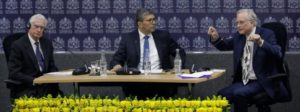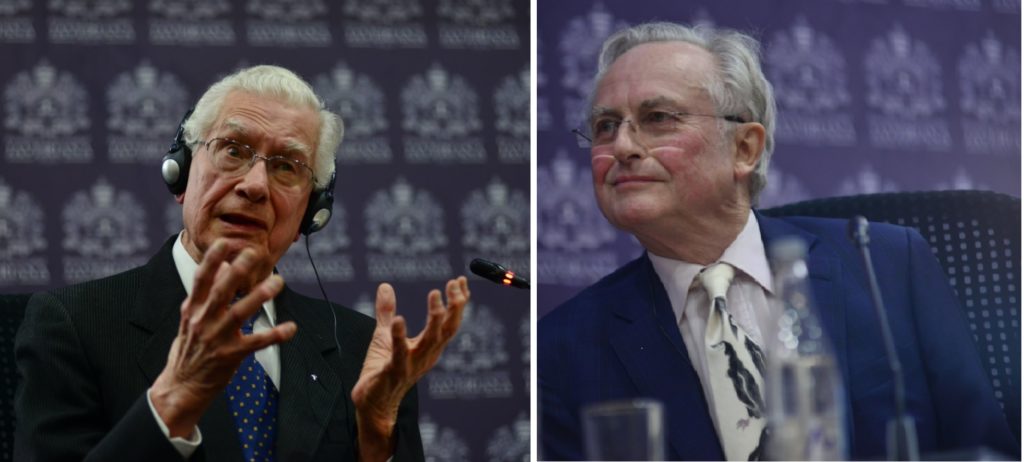Richard Dawkins in Colombia to talk God, the soul, and the possibility that there is no divine being watching over us
The sparring partners entered to the song ‘Eye of the Tiger’ made famous in Rocky films, flanked by their entourages. One was more prepared, better trained, and had many more fights under his belt. It’s no surprise then, that this man would emerge victorious, even if the throng of judges and the court of public opinion were unlikely to accept his victory.
Renowned evolutionary biologist, atheist and all-around tower of intellect Richard Dawkins sat down with a Colombian Jesuit priest on Dec. 4th to debate a very simple yet profound question: Is God an illusion? As he has done to so many theists before him, spent so much of his career railing against, and wrote best-selling, critically-acclaimed books about, Dawkins roundly thrashed his rival – Father Gerardo Remolina – with a grace, civility, and yet not-so-subtle dark sarcasm that only the British possess and intellectuals of his caliber so masterfully employ.
Such a debate in a country like Colombia would have been unthinkable just a few years ago. It’s a country where around 90 percent of the population identifies as Catholic, and almost every Colombian, (97 percent) say they believe in the existence of a god that not only created the universe, but also takes an interest in their lives. – Hola, como esta? – Bien, gracias a Dios.
Before his debate with the holy man, the politest of journalists asked Dawkins if Colombia was ready for a frank and open discussion about religion and whether God exists. He replied positively but evasively, ”I am very excited about the three civilized and constructive conversations I will have with Father Remolina.”
Perhaps a more direct yet less polite way to ask that question is whether or not Dawkins felt safe coming to so religious a country where, perhaps paradoxically – or perhaps because such faith is so rife – many of its people are prone to violence against those who express ideas they don’t like. Such a line of questioning would have been scare-mongering, of course, but only slightly so in a country that just wrapped up the longest-running internal conflict in the Americas. But Dawkins’ writings, speeches and debates are entirely in English, a language that the intolerant and violence-prone here don’t tend to speak or understand, so the arrival of a man who openly regards religious conviction as a kind of mental illness can pass unnoticed.
Dawkins in Colombia: Ideas Well Received
Dawkins and Father Remolina held the first of three conversations at Javeriana University (where Remolina is faculty head of the Theology department) and it was a heartening affair, mainly because it demonstrated just how far Colombia has come in such a short period of time. That a debate questioning the infallible ruler of Heaven and Earth was allowed to take place in a 394-year-old university founded by the Jesuit order is a testament to the openness to new ideas by many a Bogotano – enough of them to fill Javeriana’s Centro Deportivo to capacity. Such an encouraging turnout is progress by any measure.
We were lucky enough to be ringside for the academic war of words, and this is how each verbal pugilist fared…
Father Remolina began, and as a ‘sophisticated theologian’, he knew better than to dismiss evolution outright, or assert by matter of faith the existence of God, as I, an enthusiastic attendee of the debate, expected him to do. “For me there are two ways of understanding the meaning of life. The first one is the biological one … and the other is that of the meaning we give to life, and that helps us find God,” he said, adding that he believed in evolution and that science and religion were not incompatible, but rather, two ways of interpreting the nature of reality.

Richard Dawkins, right, articulates his position during the debate about the existence of God at Javeriana University in Bogota on Dec. 4th. Roughly 1,000 people were in attendance.
Sensing the coming rebuttal and seeking to deflate it, Remolina noted: “You do not have to look for science in the Bible. There we have many myths as in all peoples and cultures. A myth is a story, not a scientific explanation and since there were questions that reason could not explain, stories were created to guide and make sense of life.”
He went on: “We are historical beings. That is why we try to study the origins of the relationship of the human being with God, [and] it would also be good to study the religions of other peoples.”
Not a bad opening for someone who had assumed the monumental task of demonstrating that God is not, in fact, an illusion.
‘You Are All Atheists’
When his time came, Dawkins walked us through all the gods that have been believed in and worshiped by cultures down through the ages, and how silly it must have been to believe in such gods. It is fortunate, then, that Roman Catholics believe in the One True God, right?
“The three religions, Judaism, Christianity and Islam, collectively, are known as the Abrahamic religions. But thousands of other gods have been worshiped around the world in previous centuries … by the Vikings, ancient Greeks, the many gods of ancient Egypt. The Hindus have millions of gods. I think it’s a safe bet that everyone in the audience is an atheist with respect to all these gods,” he said.
“You are all atheists with respect to all the many sun gods of different African tribes. You are all atheists with respect to the hundreds and hundreds of sky gods, river gods, sea gods, sun gods, star gods, moon gods, weather gods. Some of us just go one god further. We add Yahweh to the long list of gods we don’t believe in.”
The reason we believe what we believe has little to do with any kind of truth, and more with our upbringing, Dawkins reasoned.
“The only reason you believe in a Christian god, as opposed to the others, is that you were brought up in a Christian household. If you’ll forgive a little sarcasm, one might say: ‘isn’t it remarkable that almost everybody in our history has believed in the same god as their parents. And what an amazing coincidence, it always turns out to be the right god!’”
Not to be out-done, Father Remolina retorted by making statements that raised the eyebrows of everyone in attendance that day, in the Colombian press, and even the religious order of which he is a member: “Adam and Eve are a myth. I want to make the distinction between what is a myth as a structure of thought of the human being when faced with questions about the universe and about himself. The myth does not pretend to explain anything, but to assume an attitude of faith, of life in front of one of those questions. And the Bible is full of myths.”
The Double-Speak of ‘Sophisticated Theologians’
It seemed Remolina wanted to strike a conciliatory tone, to demonstrate that he too pondered over the same things that the strident atheist thought about, and that they weren’t so different after all.
But instead of meeting that conciliation in kind, Dawkins pounced, calling the private beliefs of the so-called ‘sophisticated theologian’ and official Church doctrine contradictory.
“I suspect there is great distance between what sophisticated theologians say to each other, and what they say to their naïve congregations,” Dawkins said. “For instance, I suspect that Father Remolina doesn’t believe that Jesus turned water into wine, or raised Lazarus from the dead, or even that his mother was a virgin. But he probably wouldn’t say that when was preaching a sermon in front of his congregation in church.”
Dawkins added: “Many believe that what is said in [the Bible] is true and that it is a work of science. It is the work of sophisticated theologians, like Father Remolina, to remove the illusion for these people by telling the truth.”
But the priest was undaunted, and at no point would consider ‘myth’ a four-letter-word, as Dawkins did readily. He continued to attempt to blend his religious language with scientific ideas in a way that only invited contempt from the world’s most famous (notorious?) atheist.
The Catholic Church had studied the Bible “in the most scientific way possible,” Remolina said. “You have to see how from science comes to a conclusion and a spiritual certainty of the existence of God,” he said.
He added: “There’s plenty of evidence [for the existence of God], there’s the beauty of life, there’s the beauty of the universe, it’s all around us. There are people who say that [God] is in poetry, art and fable,” while posing the question to Dawkins: “Do you reject the existence of something spiritual in the human being?”
Russell’s Teapot
Dawkins, well-heeled in the implications that the holy man was making, evoked the analogy of Russell’s Teapot to demonstrate that the burden of proof was not on he, but on the believer to produce evidence of the existence of God. To state that His existence cannot be disproven is an appeal to ignorance – a logical fallacy.
Dawkins said: “Bertrand Russell was a great philosopher. He was an atheist. He said something like ‘just as I cannot disprove the existence of God, I cannot disprove the theory that there is an ‘Eternal Teapot’ in orbit around the sun. You cannot disprove it, but most of us get on with our lives working under assumption that there is no teapot, without evidence for one. We don’t actually have to disprove the existence of God, we just simply say, ‘there is no evidence in the slightest that there is a God any more than there is a celestial teapot.”
Or any more evidence than there is for the existence of the Flying Spaghetti Monster.
As for the question of human spirituality, Dawkins didn’t mince words. He also said that Remolina’s emphasis on the importance on myths and symbolism was evasive and disingenuous.
“I don’t believe in the living soul,” Dawkins said. “What we feel as a soul is our subjective consciousness, it’s brain-stuff, and brain-stuff decays. As regrettable as it may seem, we have only one life, and that’s it. Of course symbols are important – but so is reality, and I think it’s very important to distinguish between souls and reality.
“What I worry about is the tendency to muddle the two up. And particularly to mislead congregations when you talk about symbols, because they believe you’re talking about reality. So when you talk about Adam and Eve as a symbol of something, when you talk about miracles as a symbol of something that did not actually happen, the people in the church congregation … for them, these things did happen.”
‘But what of children!’ the moderator implored the man of science. Should they be deprived of the comforting fantasy that religion provides?
Dawkins said: “I don’t think that anyone should be afraid of accepting reality. But I understand that one could be accused of depriving [children] of comfort, that they have a guardian angel looking over their shoulder and protecting them, and that they’ll go to paradise after they die.
“But I prefer to stand up and face what may be the cold wind of reality, and to recognize what is actually true. So you’d better get used to the idea.”
***

R.I.P. Hitch.

Journalist. Misfit. Malcontent. Provocateur. Is a better Colombia is possible? We’re starting to have doubts.

